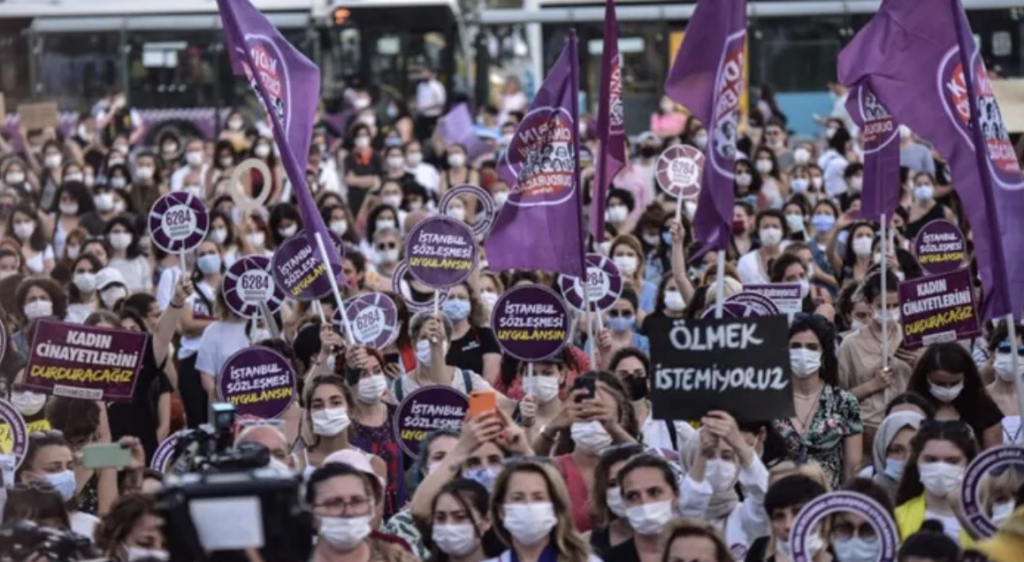Content warning: physical/sexual violence against women.
In 2017, the viral #MeToo movement took the world by storm, inspiring women to use their voices to open up about their stories of sexual assault. Social media played an instrumental role in elucidating the toxic rape culture that has long pervaded our society. With the increased time spent on our phones due to the stay-at-home regulations of the pandemic, activism has been pushed to new feats, facilitating the rise of a new social media campaign — one focused on the patriarchal challenges faced by women in Turkey. In July, the case of 27-year old Turkish female university student, Pınar Gültekin, who was brutally kidnapped and murdered by her ex-boyfriend, prompted a national outcry. The spread of information through social media was swiftly regarded as an effective way to campaign, blossoming into a revolutionary moment for Turkish women to share their grievances with a wider audience. The #ChallengeAccepted movement captured the attention of millions of women worldwide. As a way to empower each other, women flooded Instagram with posts of black and white photos with this trending hashtag, tagging their female friends. As these posts gained traction, some of the urgency and meaning behind the effort was lost, but the stories behind the posts left a lasting impact. Today, Turkish women continuously strive to raise awareness of the realities of gender inequality and fight to keep the long-neglected issue of femicide in the limelight.

A wall of 440 pairs of high heels symbolizes the number of women murdered by men in Turkey in 2018. In Turkish tradition, it is customary practice when someone dies to leave their shoes outside their homes as a sign of mourning.
Featured image by REUTERS/Mesude Bulbu.
Background of Femicides in Turkey
Femicide is not a new issue in Turkey, and the culture of ignoring its existence has made an already horrific situation worse. According to the World Health Organization, 38% of women in Turkey are subject to violence from a partner in their lifetime, compared to an average of 25% in Europe. Despite this fact, the Turkish government does not keep official statistics on femicide and has admitted to not recording instances of violence against women. According to lawyer Hülya Gülbahar, the last year that Turkey’s conservative government (under President Erdoğan) has kept records on domestic violence is 2009. Based on the statistics of case files from that year, “the Justice Ministry initially recorded the killings of 953 women in the first seven months of the year — then revised it to 171 for the entire year.” Essentially, the government is complicit in the spread of misinformation about the prevalence of femicide. Responding to this irresponsibility, the campaign advocacy group We Will Stop Femicide has stepped up to compile their own data on deaths from news reports and victims’ families. This group adamantly tracks femicides in Turkey and focuses on promoting transparency. Last year, the platform reported 474 instances of women being murdered by men — almost half of whom were current or former spouses or romantic partners — an increase of 237 from 2013. Created by and for Turkish women, this organization has been instrumental in resisting the detrimental victim-blaming rhetoric that remains prevalent in society. This advocacy group also organizes and leads women’s rights protests, engaging the public in their findings.

Featured image by Duvar.
Legal Ramifications
The #ChallengeAccepted movement has helped expose the many injustices within the Turkish legal system. In response to femicides, Turkish courts have tended to be unfair in their treatment of women, operating under a heavily patriarchal influence. In many cases, courts allow male offenders to get reduced sentences if they display signs of regret and aid individuals in evading punishment claiming extenuating circumstances for their committed crimes. Oftentimes men’s lawyers back the perpetrators with claims that the victim provoked the act or that he did what had to be done to defend his or his family’s honour.
Established laws for the protection of women do exist in Turkey, but they are all too often ignored. There exists a vital piece of legislation from 2012, Law No. 6284 to Protect Family and Prevent Violence against Women, originally crafted with the aim to allow victims to file for restraining orders to prevent their abusers from approaching them. However, this law is largely overlooked and inconsistently implemented in practice.
The #ChallengeAccepted hashtag also urged Turkish officials to remain a signatory of the Istanbul Convention, a human rights treaty committed to the protection of women’s rights and prevention of gender-based violence. This came in response to Erdoğan’s August 13th remarks signalling a withdrawal from the Convention, stating that a regulation “which places a dynamite on the foundation of the family is not legitimate.” He has since called on his party, the incumbent Justice and Development Party (AKP), to review Turkey’s participation in the Istanbul Convention, inciting his Islamist-rooted party’s base by echoing sentiments of a strong nationalist and religious agenda. A massive disinformation campaign pushed by religious and far-right columnists depicts the Istanbul Convention as a tool of Western powers designed to destroy the family unit. Since the Convention obliges states to prosecute perpetrators and take preventive measures, leaving it would mean a massive setback for Turkish women who were protected under its legal framework and liberal policies of combating gender-based violence.
Censorship & Repression in Erdoğan’s Turkey
Maintaining affiliation with the Istanbul Convention is the first step to recognizing women’s grievances, but encouraging the government to actually align their goals with those of the Convention is not a simple feat. Under Erdoğan’s presidency, freedom of expression has been severely tarnished in an effort to preserve the conservative agenda. According to the Reporters Without Borders (RSF) 2020 World Press Freedom Index, Turkey has ranked 154th out of 180 countries, placing them in a dangerously low range. In other words, the president’s upper hand in the dissemination of media means that expository pieces against the government’s response to women’s rights do not get published by major news networks or receive the spotlight they deserve. As Berfu Şeker from a Turkish NGO “Women for Women’s Human Rights-New Ways Association” (WWHR-New Ways) articulates, Turkey’s ruling party uses excuses like religion and conservatism in an attempt to erase women as individual subjects and as economic and social actors, in order to constrain them to the role of mothers. Erdoğan’s words from a 2014 Istanbul Summit sum up the basis of the harmful rhetoric. His statement that equality between men and women is “against nature” set the undertones for anti-feminism expressed by the AKP party and echoes into the continued normalization of injustice against women.
In a similar sense, the right to assembly is targeted by law and order tactics. Just as women’s grievances are swept under the rug, women’s rights protests are shut down and addressed with forceful repression. This past March, Erdoğan sent police with tear gas to blockade, intimidate and silence women marching for International Women’s Day. The president’s actions send the message to women that their voices and protests for change are unwelcome.
Another oppressive tactic is seen in the unethical practices of news reporting on femicides. Across the board, damaging patriarchal undertones can be found in Turkish newspapers regardless of whether they are centre-right-leaning like Habertürk or more secular and pro-Atatürk like Sözcü. According to Filmmor, 60% of femicides appear on the third page of Turkish newspapers alongside tragic knife crimes, car accidents, and shootings. In this manner, the stories are not as visible to the average newspaper reader and essentially do not receive the attention or outrage that they warrant. Additionally, headlines based on the offender’s testimony include excuses for the perpetrator’s behaviour, including separation, rejection, jealousy, virtue; the crimes are thus framed as legitimate, with the female survivors not even alive to defend themselves. On top of this, the articles often focus on the gruesome details of the murder or incident, trading an emphasis on the injustice of the situation for a disrespectful dramatization. News agencies are evidently guilty of perpetuating the normalization of gender-based violence, revealing a need for a radical shift in their dialogue and approach to women’s issues.
The COVID Lockdown Impact: Patriarchy in a Pandemic
In the era of a global pandemic, another disease of domestic violence is surging in people’s homes, killing many in the place where they should feel the safest. From March 11 to 31 alone, 21 femicides were reported in Turkey by the We Will Stop Femicide Platform. A police report found that 72.8% of femicides in Turkey occurred in apartments or housing complexes. As lawyer and activist with the TCK 103 Women’s Platform Selin Nakıpoğlu states, “sixty percent of femicides are a result of domestic violence.” The lockdown has resulted in a massive increase in domestic violence for Turkish women; insufficient implementation of resources has left many without ways of seeking out help. As Özlem Okan, lawyer and volunteer at Mor Çatı, a privately run shelter, stresses, there are not enough state- or municipal-run shelters in Turkey. She reveals that in 2019, there were “only 142 in a country of more than 80 million.” They are not even called “shelters” but referred to as “guest houses” to avoid the connotation that women in imminent danger are deserving of protection.
Recently, an app developed by the Turkish National Police called KADES (Woman Support Application) enabled women to seek police assistance simply by pressing a large button on their phone screens. However, this app is poorly promoted and when women do use this resource, their reports are frequently not taken seriously. In several documented instances, women in danger seeking assistance by calling police were turned down. Some of the reasons given by police have been that the callers were not married or did not file official abuse reports, factors which are not required in order to obtain aid. In essence, this proves that even when women do reach out in dire situations, their efforts are grossly undermined and sadly, oftentimes in vain.
Concluding Remarks
Using social media as a tactic makes issues piercing, and impossible to ignore. Though evidently, #ChallengeAccepted is not a solution to the problems plaguing Turkish women, the photos accomplish the crucial first step of acknowledging the existence of injustice. Behind these images is so much more than just a female face. For Turkish women, it sends a signal of comfort and unity to know they are not alone in the fight for women’s equality. Beyond the hashtag, the We Will Stop Femicide platform is gradually increasing their reach, informing the public with updated statistics and anecdotes through social media. Their posts foster strength and a persistent will to keep fighting for women’s lives. In their pursuit to prove to the world they are deserving of mass attention, Turkish women show tremendous courage, especially in an environment that tries to silence their voices. The drive to open up and demand change is not going away anytime soon, but in fact is only growing stronger by the day.
Featured image by Balkan Hotspot.




